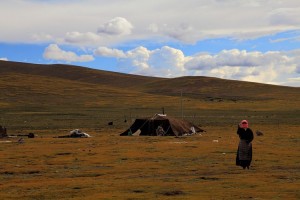The Suffering of Tibetan Nomads
by Dorji Kyi
Recent news articles tell of Tibetan people whose lives have been devastated by forced resettlement, with reports of unemployment, poverty and alcoholism. The Chinese authorities claim that their nomad resettlement policy is bringing social and environmental benefits, but what is happening to the people whose lives have been changed so drastically?
 The story of Tibetan nomads, known as drokpa in the Tibetan language, appears as a blissful dream in today’s complex and competitive world. The Tibetan people are proud of their nomad culture which has been thriving for more than eight millennia, despite the Chinese government labelling it as backward and uncivilised.
The story of Tibetan nomads, known as drokpa in the Tibetan language, appears as a blissful dream in today’s complex and competitive world. The Tibetan people are proud of their nomad culture which has been thriving for more than eight millennia, despite the Chinese government labelling it as backward and uncivilised.
Tibetan nomads live in one of the world’s most hostile environments, at altitudes of 5000 metres. Groups of between ten and twenty families travel together with their herds and yak hair tents, practising seasonal migration using their intimate knowledge of the landscape to find the best grazing for their animals and to sustain their lives. This tradition provided a sustainable lifestyle for more than 2.5 million Tibetan nomads until the Chinese government introduced their non-voluntary resettlement policy in the 1990s. Critics of the nomad resettlement programme view the policy as a way for the Chinese government to control the Tibetan population.
Despite the Tibetan nomads having lived in harmony with nature for thousands of years, the Chinese government blames them for the recent grassland degradation, claiming that the nomads are overgrazing the pastures.
In the name of conservation and protection of the grasslands and development, hundreds of thousands of nomads are being removed from their ancestral pastures into impoverished resettlement towns built by the Chinese government.
Last year the British Telegraph published an article projecting a positive picture of the resettlement policy and how it has benefits for 210,000 Tibetan nomads. A former nomad named Zamzon was quoted as saying “The settled life gives us more freedom and options; I hope my grandchildren will earn their living with pens, not whips. I don’t want my offspring to always be busy at the back end of a yak”. The article made no mention of problems faced by the nomads in the resettlment camps, despite a number of protests by nomads in recent years. Numerous reports and articles have been written by activists and writers inside Tibet on the widespread social problems and unhappiness amongst these people.
The Tibetan activist and writer Tsering Woeser wrote in August 2012, “These many Tibetan nomads who used to be herdsmen, keeping livestock, have been forced to integrate in what is referred to as a modern environment. Their language, food and lifestyles underwent great changes, not to mention that there was no place to practise religion in their new location; it becomes clear that this kind of ‘integration’ was extremely passive and painful”. She also said “The result of this policy is probably the elimination of nomadic lifestyles, which is such an important part of Tibetan culture.”
Decades after the implementation of the resettlement policy, it is evident that the former Tibetan nomads are having serious social and economic problems. Nomads were extremely well-informed on issues relating to their pastoral life, but many are illiterate and the resettlement policy includes no education to prepare them for an entirely different lifestyle. The rate of unemployment and alcoholism has become high in the resettled areas.
Scarcity of food was never an issue for the nomads: there was an abundance of meat, butter, milk, cheese and tsampa – items which are now considered as luxuries in their new lifestyle. Reports coming in suggest a loss of integrity, respect and pride.
According to a recent report on gulfnews.com, Dolker, 42, and a former nomad, sold his last 13 yaks for 85,000 yuan ($13,000, £9,000) two years ago, a decision he now regrets. “I thought this was a lot of money, but I didn’t realise things in the town would be so expensive,” he said.“A person from the government came and convinced me I should move, but now I see I’ve lost so much. I want to go back, but it’s too late.” Dolker has yet to find stable employment.
In 2012 the Central Tibetan Administration (CTA) reported on a United Nations Human Rights Council Session when Mr Olivier De Schutter, the UN Special Rapporteur for the right to food, along with Human Rights Watch and the Helsinki Foundation, called for an end to the non-voluntary relocation of nomads. Saying that nomads were often finding themselves “worse off” in relation to access to food, they called for consultations to take place with the parties involved. Mr De Schutter also drew attention to the self-immolations in Tibet which have been made in protest specificially against the land resettlement policies.
The CTA’s report continues by saying that Lady Ashton, Vice-President of the European Commission/High Representative of the Union for Foreign Affairs and Security Policy, made a statement saying: “We are most concerned about the impact of the resettlement policy of Tibetan nomads. Tibetan culture and traditional lifestyles are based on a nomadic way of life. We do question whether the objective of environmental protection can only be reached by eliminating the traditional way of life of Tibetans who have lived for centuries in harmony with nature. We are concerned by the compulsory resettlement of all nomads which has the potential to destroy the distinctive Tibetan culture and identity”.




comment 0